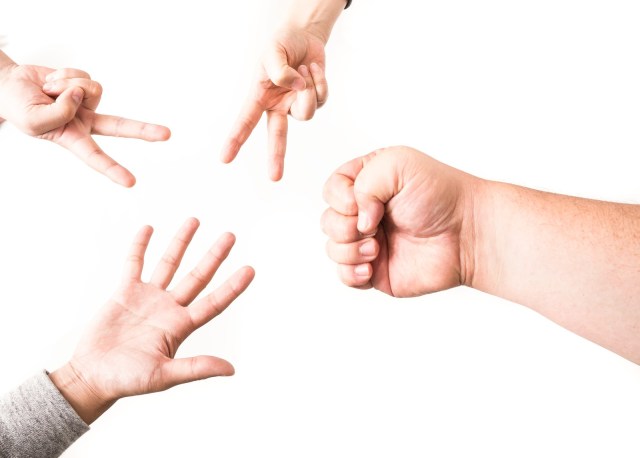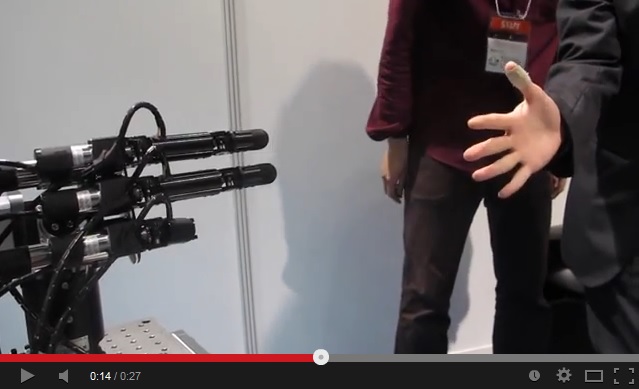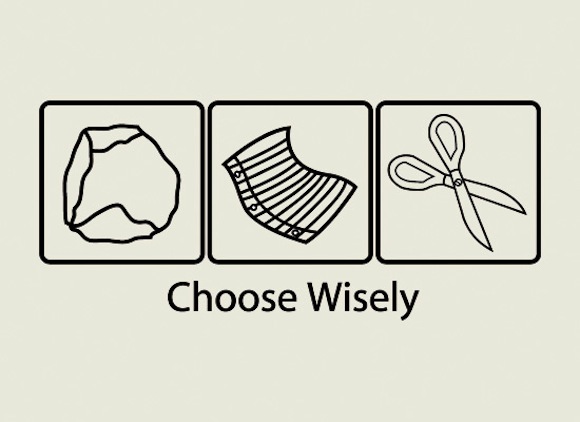Janken
Ordinarily, this much confidence would border on arrogance, but there’s no way we can stay mad at that face.
Whether resolving a dispute, deciding who pays the check for lunch, or simply passing the time, Japan’s “Jan-ken” culture is simple, surprisingly elegant, and a lot of fun.
A couple of years ago we reported on a robot hand that could always win at the timeless hand game rock-paper-scissors or janken as it’s known here in Japan. After wrapping up, we confirmed that it would never lose, declared that the human race was doomed to sit in the back seats of our robot overlords, then called it a day.
Now we are surprised to learn that Tokyo University’s Ishikawa Watanabe Lab is back with an even better performing rock-paper-scissors robot, somewhat awkwardly dubbed the Janken Robot with 100% Winning Rate.
Rock-paper-scissors. Scissors-paper-stone. Roshambo. Elephant-man-ant. Whatever you call it, chances are you’ve played it at some point. In Japan, the game is known as janken, and is used to settle any kind of dispute or awkward situation, from who gets the last cookie to which parents have to sit on the PTA that year.
It’s not hard to see why janken is so popular in Japan: it’s simple, and everyone knows how to play. It’s also efficient (particularly if the thing being decided is trivial anyway). Decisions made by janken are stuck to religiously: in three years teaching Japanese schoolkids I never once saw a student complain about the result or demand a rematch. It’s seen as a fair way to make decisions, because the game is based on luck.
Or is it? A group of researchers from Chinese universities has published a paper that shows sure-fire ways to win at rock-paper-scissors. Join us after the jump as we explore how to outsmart small children at their own game!




 Starbucks Japan releases first-ever Hinamatsuri Girls’ Day Frappuccino
Starbucks Japan releases first-ever Hinamatsuri Girls’ Day Frappuccino Family Mart ups its convenience store food game with special burger from beef bowl chain Matsuya
Family Mart ups its convenience store food game with special burger from beef bowl chain Matsuya Potama serves up epic rice balls like no other, and there’s only one store in Tokyo
Potama serves up epic rice balls like no other, and there’s only one store in Tokyo Japanese restaurant chain serves Dragon Ball donuts and Senzu Beans this spring
Japanese restaurant chain serves Dragon Ball donuts and Senzu Beans this spring Which convenience store onigiri rice balls are the most popular? Survey reveals surprising results
Which convenience store onigiri rice balls are the most popular? Survey reveals surprising results Japan’s craziest burger chain takes menchi katsu to new extreme levels
Japan’s craziest burger chain takes menchi katsu to new extreme levels Japan’s best-amenity budget hotel chain gets extra-affordable with “Global Cabin” rooms
Japan’s best-amenity budget hotel chain gets extra-affordable with “Global Cabin” rooms Drift ice in Japan is a disappearing winter miracle you need to see now
Drift ice in Japan is a disappearing winter miracle you need to see now Cast of this summer’s live-action Naruto stage play looks more awesome than ever in new photos
Cast of this summer’s live-action Naruto stage play looks more awesome than ever in new photos Burger King Japan offering all-you-can-eat quadruple cheeseburgers
Burger King Japan offering all-you-can-eat quadruple cheeseburgers Highest Starbucks in Japan set to open this spring in the Tokyo sky
Highest Starbucks in Japan set to open this spring in the Tokyo sky Tokyo Skytree turns pink for the cherry blossom season
Tokyo Skytree turns pink for the cherry blossom season Yakuzen ramen restaurant in Tokyo is very different to a yakuza ramen restaurant
Yakuzen ramen restaurant in Tokyo is very different to a yakuza ramen restaurant Japan Extreme Budget Travel! A trip from Tokyo to Izumo for just 30,000 yen [Part 1]
Japan Extreme Budget Travel! A trip from Tokyo to Izumo for just 30,000 yen [Part 1] Japan has only one airport named after a samurai, so let’s check out Kochi Ryoma【Photos】
Japan has only one airport named after a samurai, so let’s check out Kochi Ryoma【Photos】 Japanese drugstore sells onigiri at pre-stupid era prices, but how do they compare to 7-Eleven?
Japanese drugstore sells onigiri at pre-stupid era prices, but how do they compare to 7-Eleven? Burning through cash just to throw things away tops list of headaches when moving house in Japan
Burning through cash just to throw things away tops list of headaches when moving house in Japan Starbucks Japan releases new sakura goods and drinkware for cherry blossom season 2026
Starbucks Japan releases new sakura goods and drinkware for cherry blossom season 2026 Japan’s newest Shinkansen has no seats…or passengers [Video]
Japan’s newest Shinkansen has no seats…or passengers [Video] Foreigners accounting for over 80 percent of off-course skiers needing rescue in Japan’s Hokkaido
Foreigners accounting for over 80 percent of off-course skiers needing rescue in Japan’s Hokkaido Super-salty pizza sends six kids to the hospital in Japan, linguistics blamed
Super-salty pizza sends six kids to the hospital in Japan, linguistics blamed Starbucks Japan unveils new sakura Frappuccino for cherry blossom season 2026
Starbucks Japan unveils new sakura Frappuccino for cherry blossom season 2026 Foreign tourists in Japan will get free Shinkansen tickets to promote regional tourism
Foreign tourists in Japan will get free Shinkansen tickets to promote regional tourism The 10 most annoying things foreign tourists do on Japanese trains, according to locals
The 10 most annoying things foreign tourists do on Japanese trains, according to locals Take a trip to Japan’s Dododo Land, the most irritating place on Earth
Take a trip to Japan’s Dododo Land, the most irritating place on Earth Naruto and Converse team up for new line of shinobi sneakers[Photos]
Naruto and Converse team up for new line of shinobi sneakers[Photos] Is China’s don’t-go-to-Japan warning affecting the lines at a popular Tokyo gyukatsu restaurant?
Is China’s don’t-go-to-Japan warning affecting the lines at a popular Tokyo gyukatsu restaurant? Survey asks foreign tourists what bothered them in Japan, more than half gave same answer
Survey asks foreign tourists what bothered them in Japan, more than half gave same answer Japan’s human washing machines will go on sale to general public, demos to be held in Tokyo
Japan’s human washing machines will go on sale to general public, demos to be held in Tokyo Starbucks Japan releases new drinkware and goods for Valentine’s Day
Starbucks Japan releases new drinkware and goods for Valentine’s Day We deeply regret going into this tunnel on our walk in the mountains of Japan
We deeply regret going into this tunnel on our walk in the mountains of Japan Studio Ghibli releases Kodama forest spirits from Princess Mononoke to light up your home
Studio Ghibli releases Kodama forest spirits from Princess Mononoke to light up your home Major Japanese hotel chain says reservations via overseas booking sites may not be valid
Major Japanese hotel chain says reservations via overseas booking sites may not be valid Put sesame oil in your coffee? Japanese maker says it’s the best way to start your day【Taste test】
Put sesame oil in your coffee? Japanese maker says it’s the best way to start your day【Taste test】 No more using real katana for tourism activities, Japan’s National Police Agency says
No more using real katana for tourism activities, Japan’s National Police Agency says Japan’s craziest burger chain takes menchi katsu to new extreme levels
Japan’s craziest burger chain takes menchi katsu to new extreme levels Japan’s best-amenity budget hotel chain gets extra-affordable with “Global Cabin” rooms
Japan’s best-amenity budget hotel chain gets extra-affordable with “Global Cabin” rooms Drift ice in Japan is a disappearing winter miracle you need to see now
Drift ice in Japan is a disappearing winter miracle you need to see now Cast of this summer’s live-action Naruto stage play looks more awesome than ever in new photos
Cast of this summer’s live-action Naruto stage play looks more awesome than ever in new photos Burger King Japan offering all-you-can-eat quadruple cheeseburgers
Burger King Japan offering all-you-can-eat quadruple cheeseburgers Japan Extreme Budget Travel! A trip from Tokyo to Izumo for just 30,000 yen [Part 2]
Japan Extreme Budget Travel! A trip from Tokyo to Izumo for just 30,000 yen [Part 2] Yakuzen ramen restaurant in Tokyo is very different to a yakuza ramen restaurant
Yakuzen ramen restaurant in Tokyo is very different to a yakuza ramen restaurant Hey, 2020s kids! The ’90s have a sticker picture message waiting for you in Tokyo
Hey, 2020s kids! The ’90s have a sticker picture message waiting for you in Tokyo Eight surprising things to do in Northern Okinawa
Eight surprising things to do in Northern Okinawa W.T.F. Japan: Top 5 strangest kanji ever 【Weird Top Five】
W.T.F. Japan: Top 5 strangest kanji ever 【Weird Top Five】 Tokyo Skytree turns pink for the cherry blossom season
Tokyo Skytree turns pink for the cherry blossom season “Bumping men” are a uniquely Japanese class of criminals that are hard to deal with
“Bumping men” are a uniquely Japanese class of criminals that are hard to deal with One of Japan’s rarest sweets is a sell-out hit that looks and tastes like frost
One of Japan’s rarest sweets is a sell-out hit that looks and tastes like frost 7-Eleven Japan now sells fresh-fried doughnuts, but are they any good?【Taste test】
7-Eleven Japan now sells fresh-fried doughnuts, but are they any good?【Taste test】